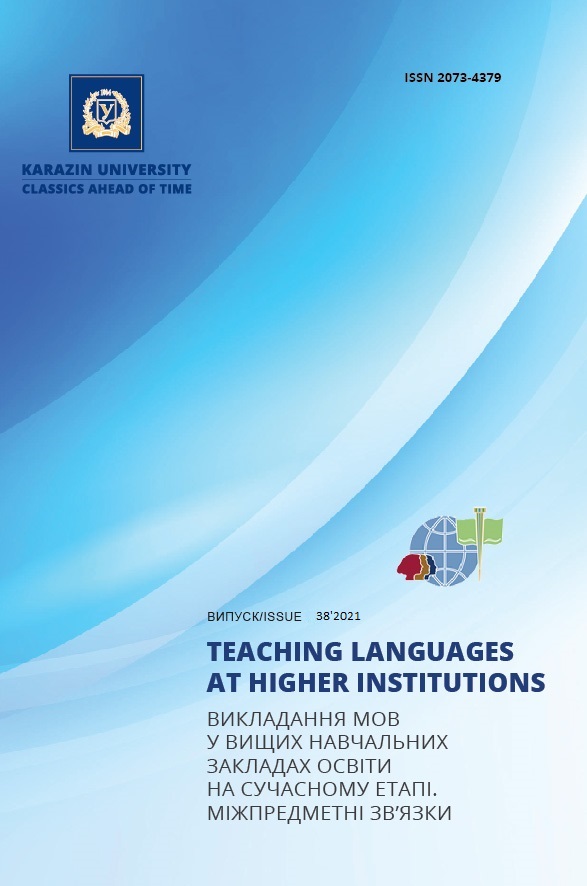The formation of language competence of foreign students-economists by means of distance technologies
Abstract
The article analyzes the possibilities of using the authors’ course “Foreign language” (for foreign students), certified by the E-learning center of V.N. Karazin Kharkiv National University, on teaching a language of instruction to 2nd-year foreign students of economic specialties. The relevance of the article is undeniable in the transition to a blended or full-distance learning system in higher education.
The authors have outlined research on the issue of e-learning and distance learning, identified the most productive forms of working with foreign audiences (“Face-to-Face Driver” and “Flex”). The structure of the authors’ course “Foreign language” (for foreign students), posted on the Moodle platform, and the peculiarities of its application are discussed in detail. The tasks included in the course, consisting of three sections (six topics), are aimed at developing language competence (learning grammar of complex sentences), skills of working with texts of educational-professional and socio-cultural spheres of communicative connection (specifically professional economic texts and culturological ones). The authors state that the theoretical explanations of grammatical material, audio and video fragments, a detailed glossary containing explanations of linguistic terms, unfamiliar to students, tokens and even interpretations of economic terms, presentations, various practical and individual tasks improve students’ language skills and their communicative competence.
It has been proven that distance courses developed on the basis of the Moodle platform open up many opportunities for effective work of students while learning a foreign language within the framework of a blended learning system.
Downloads
References
Vymohy do struktury dystantsiinoho kursu, zatverdzheni rishenniam Koordynatsiinoi rady z pytan elektronnoho (dystantsiinoho) navchannia Kharkivskoho natsionalnoho universytety imeni V.N. Karazina vid 08.10.2013 r. Protokol № 2 [Requirements for the distance course approved by the Coordinating Council for electronic (distance) training Kharkiv National University V.N. Karazin of 08.10.2013. Minutes number 2]. dist.karazin.ua/moodle/cource/. Available at: http://dist.karazin.ua/moodle/cource [Accessed 20 Feb. 2019] [in Ukrainian].
Volkov S.O. (2021). Learning as a modified form of individual experience and its place in distance education. Vykladannia mov u vyshchykh navchalnykh zakladakh osvity na suchasnomu etapi. Mizhpredmetni zviazky [Teaching Languages at Higher Institutions]. Kharkiv: V.N. Karazin Kharkiv National University, 37, pp. 23–35 [in Ukrainian]. DOI: https://doi.org/10.26565/2073-4379-2020-37-02.
Kopylova, E.V., Kuriljuk, T.I. and Sanina, L.P. (2011). Chitaem teksty po ekonomike [We read texts on economics]. Kharkiv: V.N. Karazin Kharkiv National University [in Russian].
Kuharenko, V.M. Zmishane navchannya. Vebinar. [Mixed learning. Webinar]. Available at: http://www.wiziq.com/online-class/2190095-intel-blended [Accessed 20 Feb. 2019] [in Ukrainian].
Kuharenko, V.M., Berezenska, S.M., Bugajchuk, K.L. , Olijnyk, N.Yu. at al. (2016). Teoriya ta praktyka zmishanogo navchannya [Theory and practice of blended learning]. Kuharenko, V.M. (Ed.). Kharkiv: «Miskdruk», NTU «HPI» [in Ukrainian].
Mitrofanova, O.D. (1985). Nauchnyj stil rechi: problemy obuchenija [Scientific style of speech: learning problems]. Moscow: Russkij jazyk [in Russian].
Pogorelskaja, L.I. (2015). Osobennosti nauchnogo teksta v uchebnom posobii po jazyku specialnosti [Features of the scientific text in the textbook on the specialty language]. In: XIII Kongress MAPRJAL “Russkij jazyk i literatura v prostranstve mirovoj kultury” [The Thirteenth Congress MAPRYAL “Russian language and literature in the space of the world culture”]. Granada, Ispanija, 10, pp. 830–834 [in Russian].
Sikora, Ya. (2016). Realizaciya zmishanogo navchannya u vyshhomu navchalnomu zakladi [The implementation of the blended learning in a higher educational institution]. Naukovyj visnyk Uzhgorodskogo nacionalnogo universytetu [Scientific herald of Uzhgorod National University]. Uzhgorod, 2, pp. 236–239 [in Ukrainian].
Starichenko, B.E., Semenova, I.N. and Slepuhin, A.V. (2014). O sootnoshenii ponjatij elektronnogo obuchenija v vysshej shkole [On the relationship between the concepts of e-learning in higher education]. Obrazovanie i nauka [Education and science], 9, pp. 51–68 [in Russian].
Ushakova N.V. (2018). The problemsof training listening skills of foreign students by information and communication technologies. Vykladannia mov u vyshchykh navchalnykh zakladakh osvity na suchasnomu etapi. Mizhpredmetni zviazky [Teaching Languages at Higher Institutions]. Kharkiv: V.N. Karazin Kharkiv National University, 33, pp. 89–102 [in Ukrainian]. DOI: https://doi.org/10.26565/2073-4379-2018-33-08.

